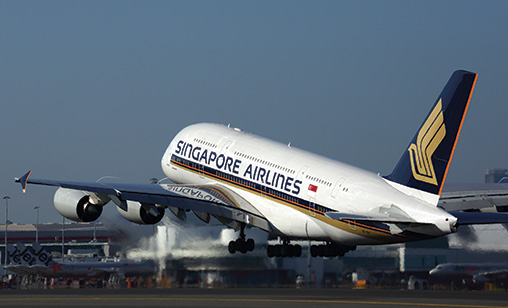News Backgrounder
Unfair and unreasonable?
Britain’s aviation regulator and five global airlines are in dispute over compensation payments for passengers who missed connecting flights because of delays.
April 1st 2017
Five airlines, including Singapore Airlines (SIA), have been accused by the UK Civil Aviation Authority (CAA) of failing to pay compensation to passengers who missed their connecting services because of flight delays. Read More »
The CAA said compensation must be paid to passengers if they arrive at their final destination more than three hours later than scheduled.
 |
CAA director of consumers and markets, Richard Moriarty, said he was disappointed with the stance of SIA as well as that of American Airlines, Emirates Airline, Etihad Airways and Turkish Airlines.
“Airlines’ first responsibility should be to look after their passengers and not to find ways to prevent passengers from upholding their rights,” said Moriarty. “It’s disappointing to see a small group of airlines continuing to let down passengers by refusing to pay them the compensation to which they are entitled.”
Airlines have been protesting about passenger compensation rules since they were introduced by the European Union (EU) in 2004. European Commission Regulation 261 determined compensation must be paid for certain types of passenger delay.
The regulation was tested and upheld in passengers’ favour in decisions by the European Parliament, the European Courts of Justice and in 2014, at the UK Appeal Court. However, every year, thousands of disgruntled passengers sue airlines, or threaten to sue, because they have not been compensated for delayed journeys.
The European law specifies that passengers on long-haul flights are to receive $316 if their flights are delayed for three to four hours and $632 if their journeys result in delays of more than four hours.
For long-haul Asia-Pacific carriers, operating wide-body jets with hundreds of passengers on each service, this is big money. Delays caused by bad weather or strikes do not attract compensation claims.
Emirates Airline is involved in a case that is proceeding all the way to the UK Court of Appeal after it refused to pay flight delay compensation to some of its passengers. And the CAA has alleged SIA’s policy is to put compensation claims “on hold” if they involve connecting flights. If the Appeals Court finds in favour of the CAA, carriers face fines that will be greater than the disputed compensation claims.
“Singapore Airlines has been in contact with the UK CAA on this issue for some time. There is a lack of clarity in the law, which is the subject of ongoing litigation before the Court of Appeal. We will continue to work with the CAA to resolve our differences with respect to the application of EC Regulation 261/2004 to missed connections,” an SIA spokesman told Orient Aviation.
Emirates strongly denied the CAA claims, but the UK body said its complaint data showed the most criticized airline for non-payment of compensation for connecting flights was the Dubai-headquartered carrier.
“We will rigorously defend our position, and challenge the blanket application of EC 261 to every situation, without consideration of context or the safety of our passengers. Many flight delays are caused by factors that are not the airline’s responsibility, such as inclement weather, bird strikes and airport closures,” it said.
Gulf neighbor, Etihad Airways, said: “Before even completing the dialogue, we find the CAA’s approach wholly unprofessional and unacceptable to publicly blame Etihad Airways for infringements to passengers’ rights we unreservedly deny. Etihad Airways will, of course, abide by any decision of the Court of Appeal.”
The CAA conducted a “comprehensive review” of the flight policies of the 31 top carriers flying into the UK. “The airlines confirmed to the CAA they do not pay compensation to passengers who experienced a delay on the first leg of a flight that caused them to miss a connecting flight and, as a result, to arrive at their final destination more than three hours late. The airlines’ refusal to pay compensation in these instances fails to meet the legal passenger rights requirements for flight disruption,” it said.
It focused on airlines’ care and assistance during disruption, compensation for missed connections, denied boarding (when passengers are bumped from their original flights) and downgrading (when passengers are downgraded to a lower seat class).
“Where we see evidence of passengers systematically being denied their rights, we will not hesitate to take the necessary action to ensure airlines change their policies and their customers get the assistance they are entitled to,” Moriarty said.
In 2015, the CAA took similar action against Aer Lingus, Jet2 and Wizz Air.